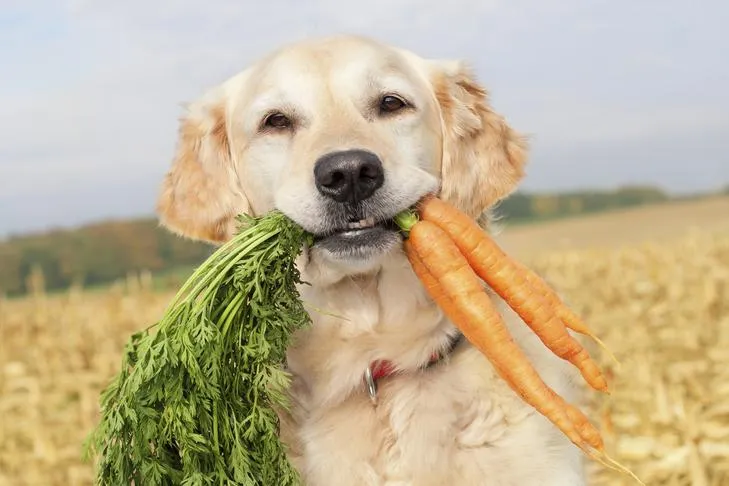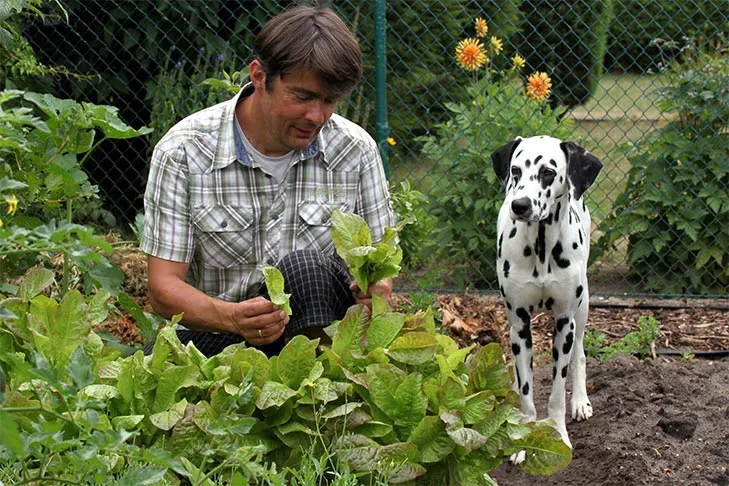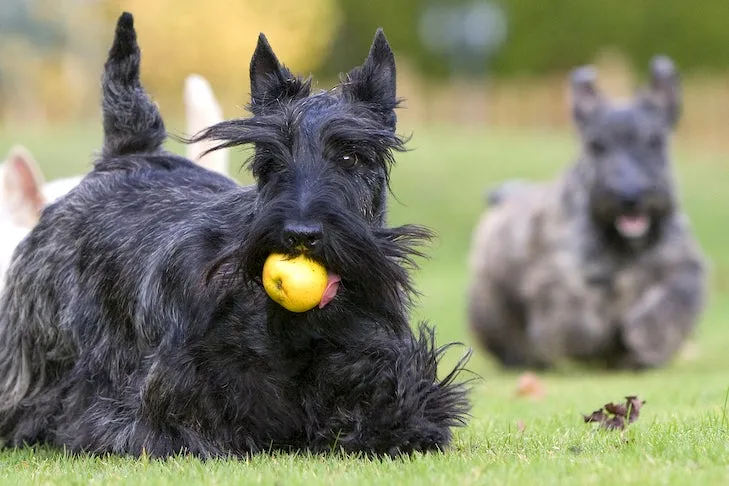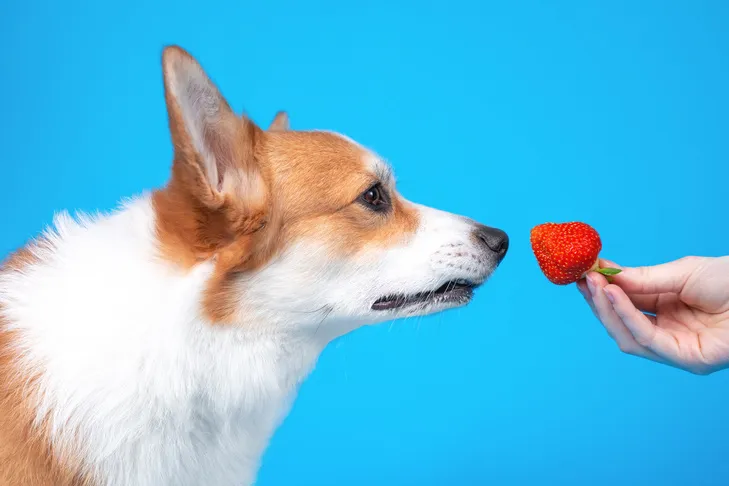It’s natural for dog owners to want to share their favorite human snacks with their beloved companions. However, what’s safe for humans isn’t always safe for dogs. Understanding what human food do dogs eat and which items are off-limits is crucial for your pet’s health. Dogs digest foods differently, and introducing the wrong fruits or vegetables can lead to serious health issues, including long-term problems or even fatalities. While dogs, as omnivores, don’t strictly require fruits and vegetables in their diet, offering dog-safe options as occasional treats is perfectly acceptable. This guide will focus particularly on answering What Vegetables Are Toxic To Dogs, alongside other harmful and beneficial produce.
Vegetables Your Dog Must Avoid
When considering what vegetables are toxic to dogs, it’s paramount to be aware of common produce that can pose serious risks. Certain vegetables, even those considered healthy for humans, contain compounds that are harmful or downright poisonous to canines. Always keep these items out of your dog’s reach and consult your veterinarian immediately if you suspect your dog has ingested any of them.
Onions (and Related Allium Plants)
Onions, along with leeks, chives, and garlic, belong to the Allium family and are highly poisonous to most pets, especially cats, but dogs are also very susceptible. Ingesting these vegetables can cause your dog’s red blood cells to rupture, leading to a condition called hemolytic anemia. Symptoms include vomiting, diarrhea, stomach pain, and nausea. Japanese breeds like Akitas and Shiba Inus are particularly sensitive. It’s crucial to ensure children understand not to share foods containing onions with your dog, and to secure leftovers in dog-proof containers.
Wild Mushrooms
While certain mushrooms found in supermarkets are generally considered safe for dogs (after being thoroughly washed), wild mushrooms are an absolute no-go. Of the tens of thousands of mushroom species worldwide, 50 to 100 are known to be toxic, and even a small amount of a poisonous mushroom can severely harm or even kill your dog. Since it’s incredibly difficult to distinguish between safe and toxic wild mushrooms, it’s best to treat all wild mushrooms as dangerous and prevent your dog from foraging them.
Asparagus
Asparagus isn’t necessarily toxic to dogs, but it offers no real nutritional benefit for them either. Its tough, fibrous stalks are difficult for dogs to chew and can pose a choking hazard or cause gastrointestinal upset. By the time asparagus is cooked down to a soft enough consistency for dogs, it loses most of its already minimal nutritional value. There are many other vegetables that provide far greater health benefits and are safer to share with your dog.
Spinach
While not acutely toxic like onions or wild mushrooms, spinach is a vegetable that should be approached with caution. Spinach is high in oxalic acid, which can interfere with the body’s ability to absorb calcium and can contribute to kidney damage over time, especially in large quantities. While a dog would likely need to eat a significant amount of spinach for this problem to occur, it’s generally best to opt for other, more beneficial leafy greens or vegetables as treats. If you wish to offer spinach, do so sparingly and in very small amounts.
Fruits Your Dog Should Never Eat
Beyond vegetables, several common fruits are surprisingly dangerous for dogs. It’s important for pet owners to be aware of these to prevent accidental poisoning or adverse health reactions.
Avocado
Avocado contains persin, a fungicidal toxin found in the pit, skin, and leaves of the plant. While the fleshy fruit contains less persin, it can still be enough to cause vomiting and diarrhea in some dogs. Furthermore, avocado flesh is very high in fat, which can lead to gastrointestinal upset and contribute to serious health conditions like pancreatitis if consumed in large quantities. The large pit also presents a choking hazard and can cause intestinal obstruction.
Cherries
The fleshy fruit around the seed of a cherry is generally safe, but the pits, stems, and leaves of cherry plants contain cyanide, which is highly toxic to dogs. Cyanide interferes with cellular oxygen transport, preventing your dog’s blood cells from getting enough oxygen. If your dog eats whole cherries or cherry pits, watch for signs of cyanide poisoning, such as dilated pupils, difficulty breathing, and red gums, which constitute a veterinary emergency. Always dispose of cherry pits securely in a dog-proof trash bin.
Grapes and Raisins
Grapes and raisins are exceptionally dangerous for dogs, regardless of breed, sex, or age. Even small amounts can lead to acute sudden kidney failure, a life-threatening condition. If you suspect your dog has ingested any grapes or raisins, contact your veterinarian immediately. Be especially vigilant if you have children who eat these fruits, and always ensure they are stored out of your dog’s reach. Never add them to a compost heap that your dog might access.
Tomatoes
While the ripened red flesh of a tomato fruit is generally considered safe for dogs in very small quantities, the green parts of the tomato plant—including the leaves, stems, and unripe tomatoes—contain a toxic substance called solanine. Although a dog would typically need to consume a large amount of the plant to become seriously ill, it’s safer to avoid giving dogs tomatoes altogether to prevent any accidental ingestion of the toxic green parts. If your dog has a habit of exploring your garden, ensure they cannot access your tomato plants.
 Rottweiler laying down in the yard, its head tilted.
Rottweiler laying down in the yard, its head tilted.
Safe Vegetables Your Dog Can Enjoy
Fortunately, many vegetables are not only safe but also healthy additions to your dog’s diet, offering a wealth of vitamins, minerals, and fiber. These can be excellent low-calorie treats when offered in moderation.
Broccoli
Broccoli can be a safe and healthy treat for dogs in small amounts. It’s rich in fiber and vitamin C and is low in fat. However, the florets contain isothiocyanates, which can cause mild to severe gastric irritation in some dogs if given in large quantities. Additionally, tough broccoli stalks can pose a choking risk or lead to esophageal obstruction. It’s best to offer cooked broccoli in small, bite-sized pieces to minimize these risks and ensure easier digestion.
Brussels Sprouts
Packed with nutrients and antioxidants beneficial for both humans and dogs, Brussels sprouts can be a healthy snack. However, moderation is key, as feeding too many Brussels sprouts can lead to excessive flatulence in dogs. If your dog enjoys them, offer small, cooked portions occasionally.
Carrots
Carrots are an excellent low-calorie snack that’s high in fiber and beta-carotene, which converts to vitamin A. The crunchy texture is also great for helping to clean your dog’s teeth. Carrots are a common ingredient in many commercial dog foods and treats, making them a safe and beneficial choice for a healthy snack.
 Golden Retriever holding carrots.
Golden Retriever holding carrots.
Celery
Beyond vitamins A, B, and C, celery contains nutrients that can promote a healthy heart and may even help fight cancer. An added bonus: celery is known to help freshen a dog’s breath. Offer small, chopped pieces as a crisp and refreshing treat.
Green Beans
Green beans are a versatile and healthy option for dogs, whether chopped, steamed, raw, or canned (provided they are plain and unsalted). They are full of essential vitamins and minerals, high in fiber, and low in calories, making them an ideal treat, especially for dogs on a weight management plan. Frozen green beans can also serve as a fun, enriching snack.
Peas
Green peas, snow peas, sugar snap peas, and garden or English peas are all generally safe for dogs. They are rich in various vitamins, minerals, protein, and fiber. You can feed your dog fresh or frozen peas, but avoid canned peas due to their high sodium content.
Pumpkin
Pure pumpkin is a highly beneficial food for dogs. It’s rich in antioxidants, and its “superpower” lies in its ability to help relieve both diarrhea and constipation. When buying canned pumpkin, always choose 100% pumpkin puree, not pumpkin pie filling, which contains added sugars and spices. You can also roast fresh pumpkin and feed the peeled flesh to your dog.
 Dalmatian watching a man gardening and picking leaves.
Dalmatian watching a man gardening and picking leaves.
Safe Fruits Your Dog Can Enjoy
While focusing on what vegetables are toxic to dogs is crucial, knowing which fruits are safe can also expand your dog’s treat options. Many fruits offer nutritional benefits and make excellent occasional snacks.
Apples
Apples are an excellent source of vitamins A and C, as well as fiber. Their low protein and fat content make them a good snack, especially for senior dogs. Always remove the seeds and core, as apple seeds contain small amounts of cyanide. Frozen apple slices can be a refreshing treat.
 Scottish Terriers playing in the grass.
Scottish Terriers playing in the grass.
Bananas
In moderation, bananas are a great low-calorie treat for dogs. They are high in potassium, vitamins, biotin, fiber, and copper, and low in cholesterol and sodium. However, due to their high sugar content, bananas should only be given as an occasional treat, not a regular part of your dog’s diet.
Blueberries
Blueberries are a superfood packed with antioxidants, which help prevent cell damage in both humans and canines. They are also rich in fiber and phytochemicals, making them a healthy and delicious snack. Blueberries are great for training or as a small, refreshing treat.
Cantaloupe
Cantaloupe is nutrient-dense, low in calories, and a good source of water and fiber. However, its high sugar content means it should be offered in moderation, particularly for dogs who are overweight or have diabetes. Freezing small cubes of cantaloupe can provide a hydrating enrichment snack.
Cranberries
Both fresh and dried cranberries are safe for dogs in small quantities. They are low in sugar and calories but high in fiber, manganese, and vitamin C. Always opt for unsweetened cranberries, as many dried varieties for human consumption contain added sugars that dogs don’t need.
Cucumbers
Cucumbers are particularly beneficial for overweight dogs because they contain very few carbohydrates or fats and are full of hydrating water. They are also loaded with vitamins K, C, and B1, along with potassium, copper, magnesium, and biotin. Cool cucumber slices are an excellent treat on hot days.
 Russell terrier funny portrait with cucumber slices.
Russell terrier funny portrait with cucumber slices.
Mango
This sweet, tropical fruit is a good source of vitamins A, B6, C, and E, as well as potassium, beta-carotene, and alpha-carotene. As with peaches and cherries, always remove the hard pit first, as it contains small amounts of cyanide and can be a choking hazard. Mango is high in sugar, so offer it as an occasional treat, especially for dogs prone to weight gain.
Oranges
Veterinarians consider oranges safe for dogs to eat, although many dogs are deterred by the strong citrus smell or taste. Oranges provide an excellent source of vitamin C, potassium, and fiber. Offer only the juicy flesh in small quantities, and always remove the peel and any seeds. The peel can be rough on a dog’s digestive system, and its oils may upset sensitive noses.
Peaches
Small amounts of cut-up fresh or frozen peaches are a great source of fiber and vitamin A. Like cherries, peach pits contain cyanide and must be completely removed and safely discarded. Avoid canned peaches, as they typically contain high amounts of sugary syrups.
Pears
Pears are a healthy snack for dogs, being high in copper, vitamins C and K, and fiber. Always cut the pear flesh into bite-sized chunks and remove the pit and seeds, as they contain traces of cyanide. Again, steer clear of canned pears with added sugary syrups.
Pineapple
A few chunks of fresh pineapple can be a sweet treat for dogs, provided the prickly outer peel and crown are removed. This tropical fruit is full of vitamins, minerals, and fiber. It also contains bromelain, an enzyme that can aid in protein absorption. Avoid canned or packaged pineapple in sweetened syrups due to the unnecessary added sugars.
Raspberries
Raspberries are safe for dogs in moderation and contain beneficial antioxidants. They are low in sugar and calories but high in fiber, manganese, and vitamin C. Raspberries are particularly good for senior dogs due to their anti-inflammatory properties, which can help aging joints. However, raspberries contain small, naturally occurring amounts of xylitol, so limit your dog to no more than 8 ounces of fresh or frozen raspberries.
Strawberries
Strawberries are rich in fiber and vitamin C, and they also contain an enzyme that can help whiten your dog’s teeth. Like all fruits, strawberries contain natural sugar, so offer them in moderation. Frozen strawberries can be a fun and engaging treat.
 Pembroke Welsh Corgi sniffing at a strawberry on a blue background.
Pembroke Welsh Corgi sniffing at a strawberry on a blue background.
Watermelon
Dogs can safely eat watermelon, but it’s crucial to remove all the rind and seeds first, as they can cause intestinal blockages. The flesh of watermelon is safe and hydrating, packed with vitamins A, B-6, and C, as well as potassium. Being 92% water, it’s an excellent way to help keep your dog hydrated on warm days. Freezing chunks of seeded watermelon makes a wonderful hot-weather treat.
Conclusion
Understanding what vegetables are toxic to dogs and which fruits are safe is essential for every responsible pet parent. While the desire to share human food is natural, recognizing the distinctions in canine digestion and physiology is paramount for their well-being. Always prioritize your dog’s health by researching before offering any new human food. When in doubt, it’s always best to consult your veterinarian for advice tailored to your dog’s specific needs. By being informed, you can ensure your furry friend enjoys a happy, healthy life, free from preventable dietary dangers.
For more information on safe and healthy dietary options for your canine companion, explore our guides on what are some things dogs can eat and what are dogs allowed to eat. If your dog has specific health concerns like pancreatitis, you can also learn what food can i feed my dog with pancreatitis.
